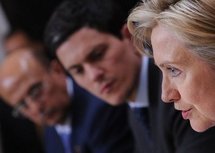West backs Yemen in extremism fight at London meeting
Katherine Haddon
LONDON, Katherine Haddon - World powers pledged to stand side-by-side with Yemen to tackle extremism after talks in London Wednesday on stopping Al-Qaeda from creating a haven in the impoverished Arab country.
British Foreign Secretary David Miliband, who chaired the meeting, told reporters it had been "an important step forward", while warning the "root causes" of militancy must be tackled.

US Secretary of State Hillary Clinton, British Foreign Secretary David Miliband and Yemeni Foreign Minister Abu Bakr al-Qirbi (AFP/POOL/Ben Stansall)
The London talks brought together ministers and officials from 21 Western and Arab countries to discuss security plus the wider economic and political problems facing Yemen.
Britain called the meeting after a foiled Christmas Day attack on a US airliner by a Nigerian man thought to have been trained in Yemen.
A statement after the meeting flagged up the world community's commitment to "supporting the government of Yemen in the fight against Al-Qaeda" and pledged not to interfere in Yemen's internal affairs.
"The challenges in Yemen are growing and, if not addressed, risk threatening the stability of the country and broader region," the statement said. "The government recognises the urgent need to address these issues."
Yemeni Foreign Minister Abu Bakr al-Qirbi welcomed the support expressed by fellow attendees for Yemen's unity and sovereignty. "What we have achieved today does indeed achieve the results (wanted) by Yemen," he said.
Miliband said five items were agreed at the meeting, including starting talks on an IMF programme for Yemen, more engagement with its security challenges and confirmation from Yemen that it will "pursue its reform agenda".
He also announced a follow-up donors' meeting in Riyadh on February 27 and 28.
London has warned that unless Yemen is stabilised, it could become a "failed state", like its lawless neighbour Somalia.
Yemen's troubles sprang to prominence when 23-year-old Nigerian Umar Farouk Abdulmutallab allegedly tried to detonate explosives in his underwear on a plane approaching the US city of Detroit on Christmas Day.
US President Barack Obama has accused Al-Qaeda's branch in Yemen -- Al-Qaeda in the Arabian Peninsula -- of training, equipping and directing the suspect. Al-Qaeda chief Osama bin Laden claimed responsibility for the plot in an audio message broadcast this week and vowed further strikes would follow.
Yemen has ruled out allowing the United States to set up military bases on its soil and stepped up its own campaign earlier this month with a military crackdown against Al-Qaeda.
But the US military and intelligence agencies have been involved in planning and equipping secret operations with Yemeni troops in recent weeks, the Washington Post reported Wednesday.
It added that the United States was also sharing sensitive intelligence with Yemeni forces.
The London talks lasted for only two hours on the eve of a major international conference on Afghanistan here, prompting claims from some lawmakers that they were a gimmick.
Yemen's many problems -- including extremism, corruption, water shortages and a dwindling oil industry that provides three-quarters of government revenues -- should be viewed as a package, according to academics.
"Any solution for Yemen requires a regional response which includes... Yemen's relationships with Somalia," said Ginny Hill, an associate fellow at foreign affairs think-tank Chatham House.
-----------------------------------------------------------------------------------